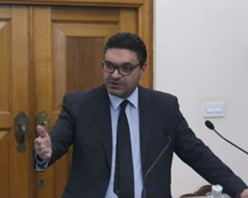CYPRUS
 The Cypriot Government is racing to prepare its response to a possible Supreme Court ruling that pay cuts to Public Servants, imposed as part of 2013 austerity measures, are unconstitutional.
The Cypriot Government is racing to prepare its response to a possible Supreme Court ruling that pay cuts to Public Servants, imposed as part of 2013 austerity measures, are unconstitutional.
The country’s Administrative Court ruled a year ago that a freeze on incremental pay rises and a three per cent contribution to pensions, plus a reduction in Public Servants’ pay, were in violation of Article 23 of the Constitution regarding the protection of the right to property.
Minister for Finance, Constantinos Petrides (pictured) said that the impact on public finances was estimated at €844 million ($A1,362 million) over a four-year period should the Government lose its appeal. This sum amounts to about 10 per cent of this year’s Budget.
“The Treasury is working on alternatives to meet all contingencies,” Mr Petrides said.
“Amending the Constitution and re-enacting the law imposing the cuts is an option.”
However, he said that alternatives were being examined should this plan prove to be not feasible.
Another potential risk to public finances along with the Public Service payroll, cited by international lenders, was the General Health System, or GESY, introduced in May 2019.
Mr Petrides said exorbitant claims by doctors might lead to a derailment of the economy.
“Safeguarding budgetary discipline is very important and it is easy to jeopardise with increased health spending,” he said.
Mr Petrides cited fiscal discipline, risk reduction in the banking sector in the form of the reduction of non-performing loans, and structural reforms as his main concerns.
“The priority is public finances and public debt, which is expected to be reduced by five percentage points a year, followed by the reduction of non-performing loans, which are a heavy legacy of the 2013 economic and financial crisis,” he said.
Nicosia, 11 February 2020











